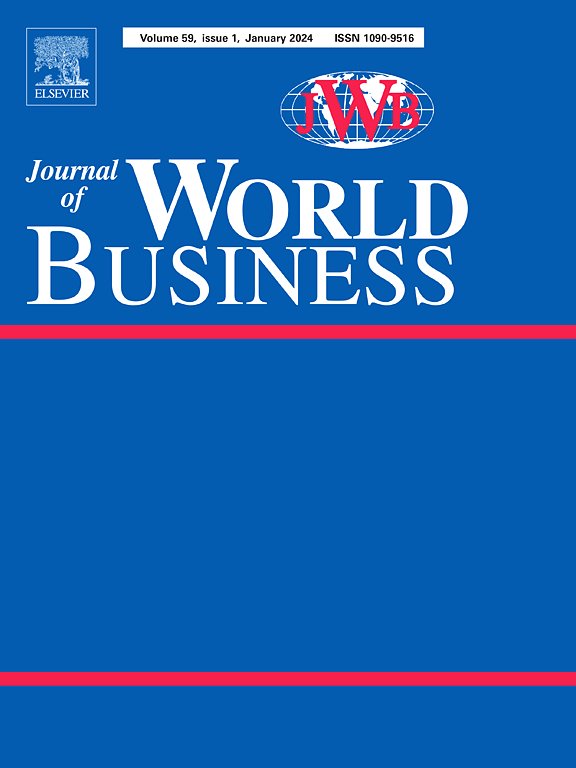女性企业家与国际进入模式选择:来自中国创业型企业的证据
IF 8.8
1区 管理学
Q1 BUSINESS
引用次数: 0
摘要
新兴经济体的女性企业家在寻求全球扩张时遇到各种障碍;因此,需要研究如何克服这些困难,实现成功的国际化。本研究考察了创业公司政治派别和家族参与两个因素对女企业家国外市场进入模式选择的影响。通过对中国风险投资公司的综合调查数据进行分析,揭示了这些因素与风险投资公司倾向于选择高承诺进入模式之间的关系。我们的研究结果表明,政治派别水平越高的女性企业家越可能选择承诺更高的国外市场进入模式。同样,那些家庭参与程度较高的人表现出对更高承诺进入模式的偏好。此外,我们的研究揭示了资源和财务约束之间复杂的相互作用。政治派别补充了财政资源,增加了更高承诺的可能性。相比之下,当财政资源有限时,家庭参与起着替代作用。本研究揭示了女性企业家所依赖的多样化资源,以及这些资源是如何独立或互动地影响女性企业家的国际进入模式选择的。这些发现有助于更深入地了解新兴经济体中女性创业的独特挑战和国际化。本文章由计算机程序翻译,如有差异,请以英文原文为准。
Female entrepreneurs and international entry mode choice: Evidence from entrepreneurial firms in China
Female entrepreneurs in emerging economies encounter various obstacles in pursuing global expansion; thus, research on how to overcome these difficulties and achieve successful internationalization is needed. This study examines the impacts of two factors, namely political affiliation and family involvement in entrepreneurial firms, on female entrepreneurs’ choice of foreign market entry mode. By analyzing comprehensive survey data from the venture firms in China, we uncover the relationships between these factors and the inclination to select higher commitment entry modes. Our findings reveal that female entrepreneurs with a higher level of political affiliation are likely to opt for a higher commitment foreign market entry mode. Likewise, those with greater family involvement demonstrate a preference for higher commitment entry modes. Furthermore, our study reveals the complex interplay between the resources and financial constraints. Political affiliations complement financial resources, increasing the likelihood of higher commitment entries. In contrast, family involvement acts as a substitute when financial resources are limited. This study sheds light on the diverse resources that female entrepreneurs rely on and how these resources, either independently or interactively, influence these entrepreneurs’ international entry mode choices. These findings contribute to a deeper understanding of the unique challenges and internationalization of female entrepreneurship in emerging economies.
求助全文
通过发布文献求助,成功后即可免费获取论文全文。
去求助
来源期刊

Journal of World Business
BUSINESS-
CiteScore
16.50
自引率
11.20%
发文量
73
期刊介绍:
The Journal of World Business holds a distinguished position as a leading publication within the realm of International Business. Rooted in a legacy dating back to 1965, when it was established as the Columbia Journal of World Business, JWB is committed to disseminating cutting-edge research that reflects significant advancements in the field. The journal actively seeks submissions that propel new theoretical frameworks and innovative perspectives on International Business phenomena. Aligned with its domain statement, submissions are expected to possess a clear multinational, cross-border, or international comparative focus, while remaining pertinent to the study of management and organizations. JWB particularly encourages submissions that challenge established theories or assumptions, presenting pioneering or counterintuitive findings. With an inclusive approach, the journal welcomes contributions from diverse conceptual and theoretical traditions, encompassing allied social sciences and behavioral sciences. Submissions should either develop new theories or rigorously test existing ones, employing a variety of qualitative, quantitative, or other methodological approaches. While JWB primarily caters to scholars and researchers, it values contributions that explore implications for Multinational Enterprises and their management, as well as ramifications for public policy and the broader societal role of business.
 求助内容:
求助内容: 应助结果提醒方式:
应助结果提醒方式:


